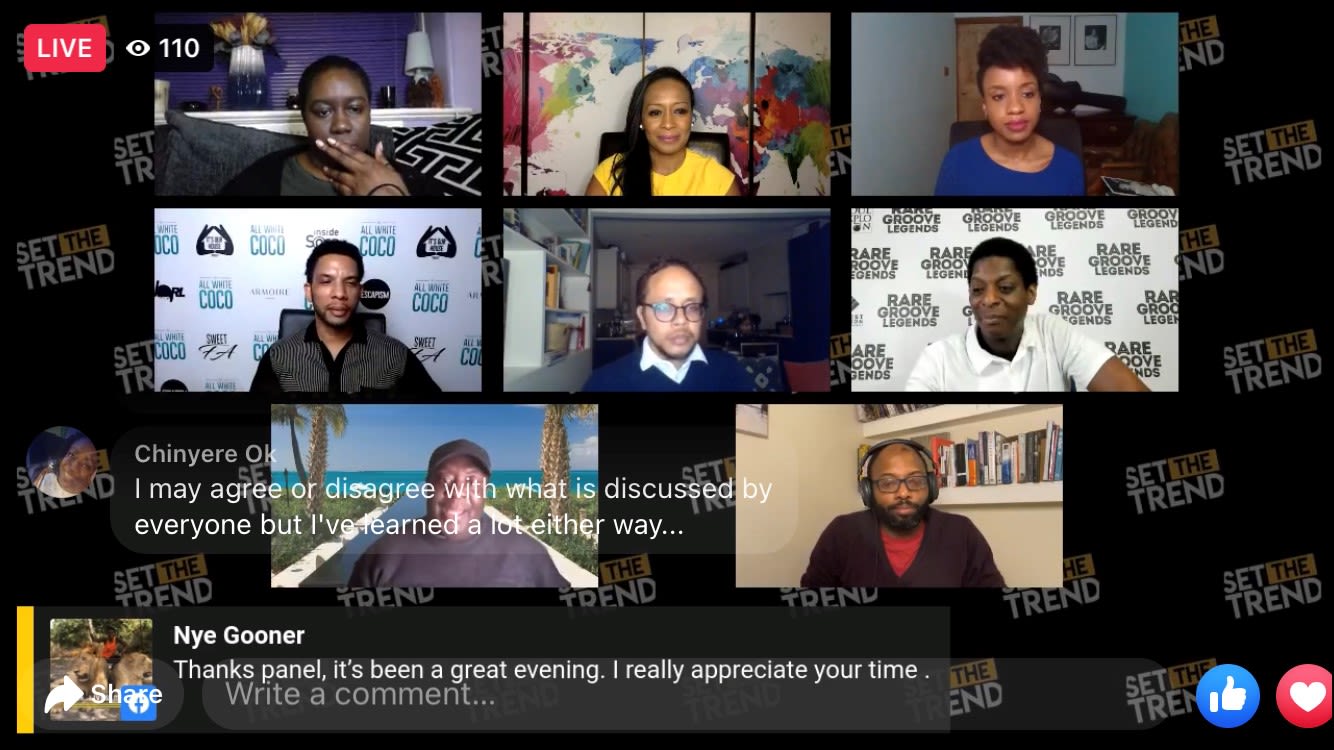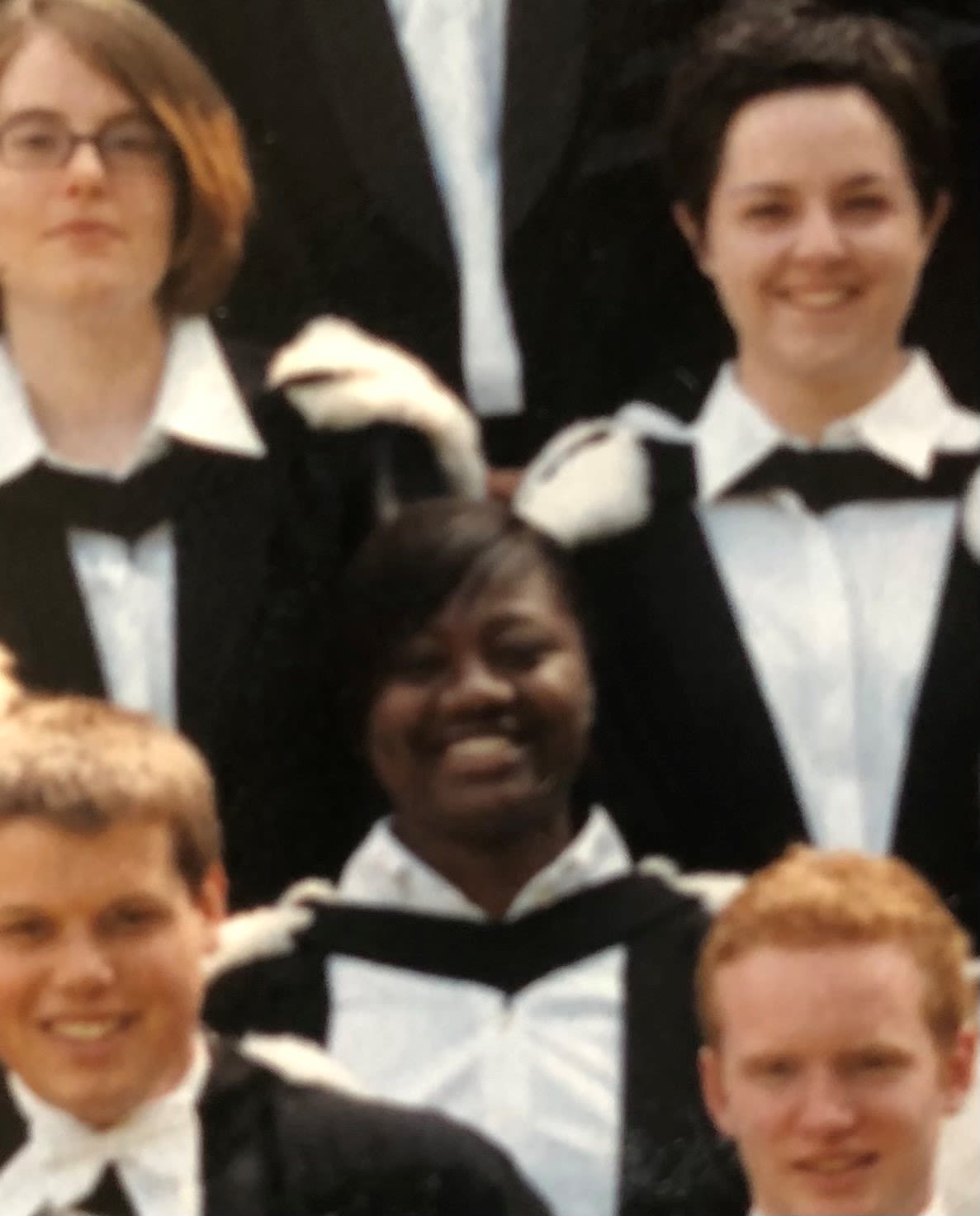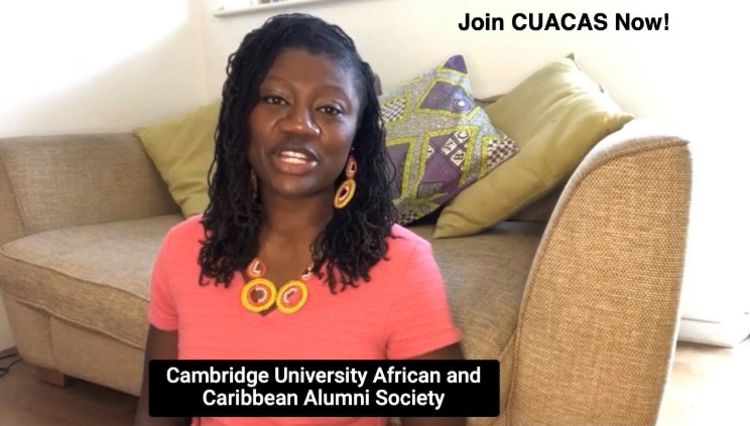Campaigning for Vaccine Literacy
Afua Kudom (2000), Clare alumna and Executive Chair of the Cambridge University African & Caribbean Alumni Society (CUACAS)

What was your journey to Clare?
I applied to Cambridge at the suggestion of my A-Level Sociology teacher. That year, five other students from my sixth form had also applied to Oxbridge and I ended up being the only person to get in and the first person from my school in ten years to do so, which I was ecstatic about!

How did your time at Clare shape you?
Studying Law at Clare was a privilege due to the reputation the subject has at the College and the excellence of the teaching. I was also a member of the Clare Women’s football team and still remember winning Cuppers in 2002. Yet my study at Cambridge wasn’t without its challenges, both academically and socially. Law was gruelling, although I especially loved family law supervisions. One of the benefits of being at Clare was that it pushed me and others who interacted with me out of our comfort zones. I was a minority in so many ways, but my presence allowed others to learn about me and people like me, just as I learned about them. It helped us all develop a greater understanding and regard for difference. I still have my College memorabilia, which I share with students through the access work I did whilst teaching and now do voluntarily. Cambridge isn’t always what people think it is. I am proud of the fact I graduated from Clare and still enjoy the shock on people’s faces when I tell them. I am a loyal alumna and I was delighted to deliver a careers workshop to current students in November 2020.
Tell us about your journey since leaving Clare.
I graduated in 2003 and joined the inaugural cohort of the highly competitive Teach First Leadership Development Programme, which is now an award-winning teacher training and leadership development graduate scheme. I wanted to use my experience at school and university to help other young people realise their academic potential. During my time as a teacher, I did a lot of access work, which mainly involved organising visits to Clare College for my students.
My teaching career was followed by a stint in public affairs, where I was part of the secretariat for the Social Integration Commission, set up by a charity called the Challenge and chaired by chief executive of the Royal Society of Arts (RSA), Matthew Taylor.
The Commission made a set of practical recommendations to government, businesses, civil society organisations and individuals as to how we can create a more socially integrated and cohesive society along the lines of age, ethnicity and income groups, and went on to establish the All-Party Parliamentary Group (APPG) on Social Integration. As an education consultant, I provided practical support to students applying to Oxbridge or other Russell Group universities to study Law or Medicine. I am now a Careers Consultant with the Careers Group, where I help students and graduates of Queen Mary University of London (School of Law) embark on careers aligned with their values, interests and strengths. I am also involved in the Pathways to Law programme delivered by the Sutton Trust. All of my roles have focused on education and personal development as I love helping people craft their destinies and honour their true selves.

How did you initially become involved with the Cambridge University African and Caribbean Alumni Society (CUACAS)?
Whilst at Cambridge, I was part of the Cambridge University Caribbean Society (CUCARIB), which was a huge support network during my time there. I strongly believe in, and have reaped the advantages of, being part of various personal and professional networks. CUACAS was founded over a decade ago by some of the members of CUCARIB whom I had stayed in touch with, so I was always aware of it. Throughout 2020, I especially benefited from being part of a WhatsApp group linked to the society, which shared useful resources, provided mutual support and willingly volunteered their time to support students I was working with in my role as a Careers Consultant and my voluntary role as a London Enterprise Adviser. There was discussion within the group of expanding the network and taking it forward across different alumni generations, so that even more people could be helped. I was happy to take the lead to make that happen and enlisted the support of other alumni who came together as a new executive team in September 2020. CUACAS’ mission is to invest in, educate and empower our local and broader communities. It provides a place for graduates of African and Caribbean descent to connect and contribute to the development of current and future members. The society believes in the power of community and self-reliance and seeks to add value wherever it can.
What inspired the current campaign on the COVID-19 vaccine?
One of the CUACAS doctors, Consultant Neurologist Dr Krista Farrell (Trinity College, 2000) had seen research published by the Scientific Advisory Group for Emergencies (SAGE), which found that 72% of Black people were unlikely to take the vaccine. Black people that were hospitalised during the first wave of the pandemic were also 50% more likely to die from COVID-19 than white patients. This new evidence suggested that if Black people did not take the vaccine, the mortality rate would be simply devastating. CUACAS doctors, including Clare alumnus and Consultant Paediatric Gastroenterologist, Dr Attah Ocholi (1998), wanted to prevent avoidable deaths and CUACAS launched a grass roots initiative in the form of the COVID-19 Vaccination Campaign. The campaign aims to reach 100,000 members of the broader African and Caribbean community who are the most vulnerable and vaccine-resistant, providing health literacy around COVID-19 and vaccination. We feel that as Cambridge graduates, we have a responsibility to use our privilege to benefit others and this current critical issue is one opportunity to do so. I am personally very passionate about education and believe in people having access to knowledge and information that will help them make informed choices, which is what this campaign is all about. It was also great to connect with Senior Clinical Research Associate at the MRC Epidemiology Unit at the University of Cambridge, Dr Raghib Ali (St Catharine’s, 1994), to share details about the campaign and gain his very helpful insights.
What strategies will the campaign employ to encourage trust in the vaccine among those of African and Caribbean heritage?
I understand the trust issues that those of African and Caribbean heritage have, due to factors such as structural racism and mistreatment within the healthcare system, which may have reduced levels of trust in the COVID-19 vaccination programme. Being able to receive accurate and up-to-date information and get their questions answered from people who look like them, understand and are willing to acknowledge these issues are key features of this campaign. We seek to boost trust in the vaccine by running Q&A events with the most vaccine-hesitant members of these communities and to provide links to data and other resources that will combat some of the myths around the vaccines and hopefully allay some of the understandable fears people may have. We are also raising the profile of the campaign in the media. Dr Krista Farrell has been featured on Sky News and the campaign has also received coverage in The Voice (Britain’s first Black newspaper) and Cambridge Network.
Could you describe the first campaign event? What were the outcomes from the discussion, and what was your personal response?
The first campaign event was the Cambridge Black Doctors’ COVID-19 Vaccine Q&A, which saw CUACAS work in concert with community-based DJs. It took place on Saturday, 20 February 2021 on the Set The Trend podcast, and we had over 400 participants join the live stream on both Facebook and YouTube. To date, the videos have received over 4.5K views. On the night, we were able to increase vaccine acceptance by 14%, based on a poll conducted with the live audience. Audience participation was incredibly high and there was a huge appetite for access to key information linked to questions and concerns that people had. I was honoured to be leading the team that made this possible and to be working alongside fellow Clare alumnus, Dr Attah Ocholi. I was also personally touched by people’s gratitude and thanks, and their request for a second event, as they had benefited so much from the information they had received.

Can you tell us a bit more about your second campaign event?
We hosted a follow-up event to the first live Q&A, again on the Set The Trend podcast, in direct response to data from the Office for National Statistics (ONS) that stated that 44% of Black or Black British adults report vaccine hesitancy compared to just eight percent of white adults. It took place on Saturday, 27 March to coincide with the anniversary week of the first UK lockdown. The timing was very apt, given talk about the forthcoming third wave. If members of the African and Caribbean communities continue to refuse vaccination, they will be hit harder than every other group with localised outbreaks in their communities, and we will not be able to control these. For the second event, CUACAS doctors Krista Farrell
and Attah Ocholi were joined by other African and Caribbean medical practitioners: Dr Sarah Ann Filson, Infectious Disease and Microbiology Registrar, who is involved in the COVID-19 related clinical trials, including the RECOVERY trial and the Oxford/AstraZeneca Vaccine trial; and Dr Hamish Mohammed, who is an Infectious Disease Epidemiologist and Consultant Scientist at Public Health England. Over 300 participants joined the live stream on both Facebook and YouTube and there were over 1.8K views within the first 24 hours.
What will the future of the campaign look like? What does success look like for you?
We want to make this a national campaign and are currently having conversations with faith leaders who are also keen to reach the most vaccine-hesitant African and Caribbean communities across the country. We also plan to run events on the audio-chat app Clubhouse to enable us to reach a global audience. We will continue to share links to key data and other useful resources on the CUACAS website. Success to us would be to provide this vital information to as many people as possible within these communities, to help improve health literacy, overturn some of the myths that currently exist and, ultimately, drive up vaccination uptake amongst those of African and Caribbean heritage.

